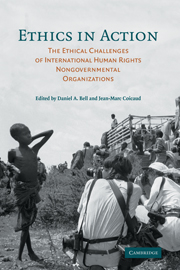Book contents
- Frontmatter
- Contents
- Acknowledgments
- List of Contributors
- Introduction: Reflections on Dialogues between Practitioners and Theorists of Human Rights
- SECTION I NORTHERN INGOs AND SOUTHERN AID RECIPIENTS: THE CHALLENGE OF UNEQUAL POWER
- 1 The Pornography of Poverty: A Cautionary Fundraising Tale
- 2 An Imperfect Process: Funding Human Rights – A Case Study
- 3 Transformational Development as the Key to Housing Rights
- 4 Human Rights INGOs and the North–South Gap: The Challenge of Normative and Empirical Learning
- SECTION II INGOs AND GOVERNMENTS: THE CHALLENGE OF DEALING WITH STATES THAT RESTRICT THE ACTIVITIES OF INGOs
- SECTION III INGOs AND ECONOMIC RIGHTS: THE CHALLENGE OF DEALING WITH GLOBAL POVERTY
- Conclusion: INGOs as Collective Mobilization of Transnational Solidarity: Implications for Human Rights Work at the United Nations
- Index
- References
3 - Transformational Development as the Key to Housing Rights
Published online by Cambridge University Press: 29 July 2009
- Frontmatter
- Contents
- Acknowledgments
- List of Contributors
- Introduction: Reflections on Dialogues between Practitioners and Theorists of Human Rights
- SECTION I NORTHERN INGOs AND SOUTHERN AID RECIPIENTS: THE CHALLENGE OF UNEQUAL POWER
- 1 The Pornography of Poverty: A Cautionary Fundraising Tale
- 2 An Imperfect Process: Funding Human Rights – A Case Study
- 3 Transformational Development as the Key to Housing Rights
- 4 Human Rights INGOs and the North–South Gap: The Challenge of Normative and Empirical Learning
- SECTION II INGOs AND GOVERNMENTS: THE CHALLENGE OF DEALING WITH STATES THAT RESTRICT THE ACTIVITIES OF INGOs
- SECTION III INGOs AND ECONOMIC RIGHTS: THE CHALLENGE OF DEALING WITH GLOBAL POVERTY
- Conclusion: INGOs as Collective Mobilization of Transnational Solidarity: Implications for Human Rights Work at the United Nations
- Index
- References
Summary
I used to be a man without a permanent address. When I saw abuse and corruption at the school where I teach, I did not dare to speak out for fear of being transferred to a remote part of the country where I could not care for my family. With this house, my family and I have a permanent address, and we will never live in fear of speaking out again. In 1823, my forefather's family was forcibly relocated from southern India to Sri Lanka to work as laborers on the tea estates. After generations of savings, my grandfather purchased this small plot of land (approximately 5–10 m), but our family did not have the money to build a home and move out of the inhuman living conditions of company line housing. As a teacher, I should qualify for a government loan, but as a low caste Tamil, my application has never been processed. We have been refused help by the bank, our local Hindu temple, the school district and the government – we had nowhere to turn. Habitat for Humanity Hatton's assistance has changed the life of my family forever. We are now a family with a permanent address, and I will never be afraid to speak out again.
– Mr. S. Durairaj at the dedication celebration of their family's new home in April 1995.- Type
- Chapter
- Information
- Ethics in ActionThe Ethical Challenges of International Human Rights Nongovernmental Organizations, pp. 54 - 78Publisher: Cambridge University PressPrint publication year: 2006



